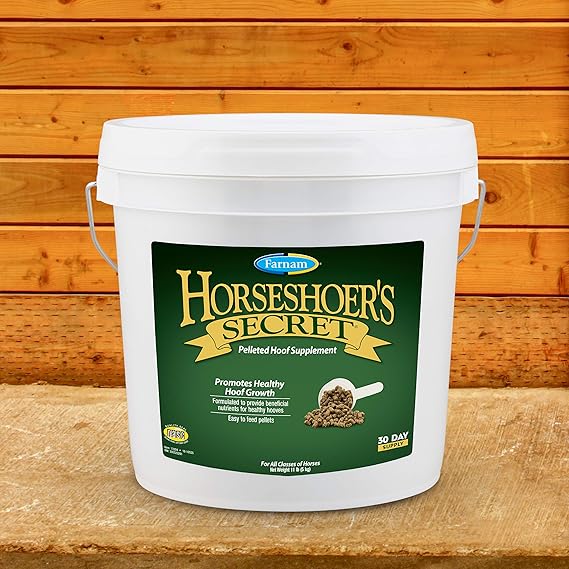Last Updated on March 2, 2022
Looking for a new four-legged friend is an exciting time, but it’s important to prepare a plan with several things to ask when buying a horse. Purchasing a horse is a big investment, regardless of the size of your budget. In order to make sure the horse you get is safe, and suits your needs, asking the right questions is essential.
Work with a Trainer or Trusted Agent
Enlist the help of a good trainer to help you with your horse search. If you don’t have a trainer, use an agent. Whichever person you use, ensure they are experienced and have a reputation for honesty.
A reputable trainer or agent will have your best interests at heart and won’t just be thinking about filling their pockets. They will take note of what type of horse you need and your budget. Using their contacts, they will be able to source horses from reputable sellers so you don’t get stung.
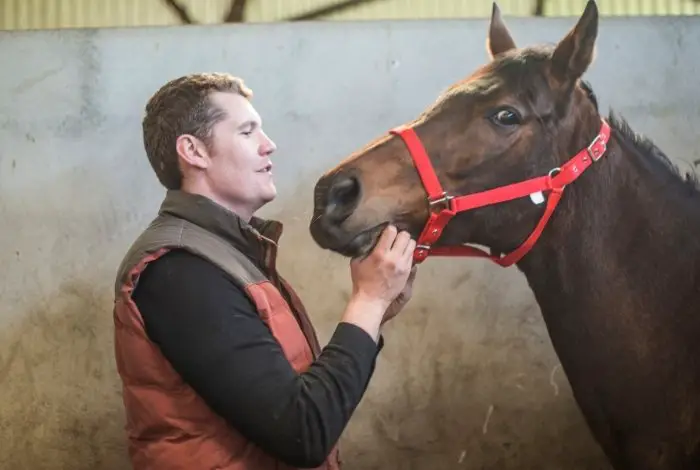
Ask Yourself What You Want
Have a serious and realistic talk with yourself about the horse you want. The horse you want may not be the horse you need. If you want a horse for pleasure riding, a high strung showjumper might look beautiful but will probably not settle into a quieter life.
Your trainer will help you evaluate your riding level and goals. Be realistic about your abilities. If you aren’t, you could over horse yourself, ending up with a horse that knocks your confidence.
Decide the age range of the horse you want. You might think getting a young horse means that you’ll get extra years of being able to ride it. However, young horses can be lively and are still in the process of their education.
If you are not experienced with green horses, problems could develop. This could lead to the horse not reaching its potential, and you, not achieving your goals. If you are inexperienced and get a young horse, work with a good trainer.
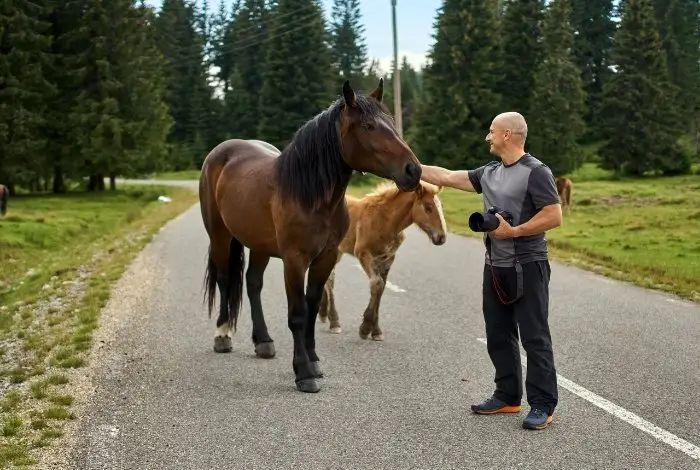
Find out When is the Best Time to Train a Horse
Avoid Buying Sight Unseen
Many horror stories of people buying horses arise because they bought without looking at the horse in person. Horse dealers with questionable tactics often take advantage of inexperienced buyers this way. They may make excuses, such as saying you need to buy now or lose the horse to someone else.
That said. Buying unseen doesn’t always go bad. If you are using an honest trainer and agent, buying without physically looking at the horse can go well. When buying unseen, don’t be afraid to ask for videos of the horse.
Things to Ask When Buying a Horse
1. Check the Horse’s History
Ask detailed questions about the horse’s history. If you’re buying a horse to compete, ask to see its competition records. This will let you know the horse is capable of doing the level you want to compete at. If there are any long gaps in the competition record, ask why.
Find out as much information about where the horse came from as you can. Ask how long the current owners have had the horse and where it was bought from. If the current owners didn’t breed the horse, see if they can provide you information about the breeder.
Ask about the horse’s medical history. While sellers might not always give you all the information, it is still a good question to tackle. You will want to know if the horse has had health problems in the past.
Not all past health problems will be something to worry about. If you’re buying an older horse, you can expect that the horse will need some extra help. That is sometimes a good trade-off if it means you get a sane, trustworthy horse.
2. Ask about the Breeding
Ask to see the breeding of the horse. While the bloodlines aren’t always important, they can help you decide if the horse will be suitable for the job it will do. If you plan on breeding the horse, knowing the pedigree is essential.
3. Discuss the Asking Price before Buying
Ask the seller the price of the horse before going to see it. If the horse is out of your budget, it wastes everyone’s time by viewing it. Once you’ve tried the horse, don’t be afraid to negotiate. The asking price isn’t necessarily what the seller is actually willing to take for the horse.
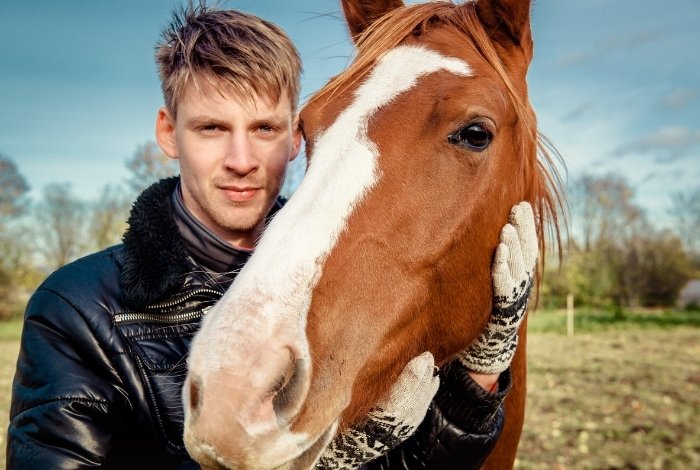
Also, consider How Much Does A Horse Cost? Average Cost Of Owning One
4. Ask If You Can Try the Horse
Always arrange a viewing of the horse you want to buy. If the seller is unwilling to allow this, that is a big red flag. Schedule a day and time to travel to the barn where the horse currently lives. Bring your agent or trainer with you.
You can request that the horse is in the stable for when you arrive. This way, you can see how the horse behaves when being handled and tacked up. Look out for any behaviors that you would prefer a horse doesn’t have.
Don’t get on the horse first. Ask the seller to ride the horse before you. Watch the horse carefully and take some videos to study later.
5. Will They Allow a Vetting
Ask the seller if they will allow you to vet the horse and if you can choose the vet. Even if you are not spending a lot of money, even basic vetting is a good idea. A vetting will reveal any hidden problems that could affect the horse.
For a competition horse, make sure you get a full set of x-rays taken, including the back. Keeping in mind what you want to do with the horse. Some issues that come up in a vetting might mean a horse won’t withstand high-level competition but do just fine at lower levels.
Farnam Horseshoer’s Secret Pelleted Hoof Supplement for Horses
6. Ask about the Horse’s Temperament
Assessing the horse’s temperament is essential to finding the right match. You might love a quirky horse, or it may only cause you frustration. A sensible horse is often more suitable than one that needs lots of lunging so it’s quiet enough to ride.
7. Does the Horse Require Maintenance
Maintenance refers to regular medication or treatments that the horse needs regularly. This can vary greatly. It could be anything from supplements to bi-monthly physiotherapy sessions to half-yearly joint injections.
If a horse needs maintenance, it doesn’t mean you should write it off if it meets the rest of your criteria. Plenty of horses comfortably perform their jobs for years while getting some type of maintenance.
8. What Has the Horse Done
Ask about what level the horse has competed at. If you’re looking for a pleasure horse, ask how much trail riding experience the horse has. If you’re looking at a young horse, establish how much training the horse has had.
9. How Does the Horse Live
How the horse is currently living is a question you might not think of. However, it is very important if you want a happy horse. A horse that lives outside most of the time or vice versa is going to have trouble adjusting to the opposite.
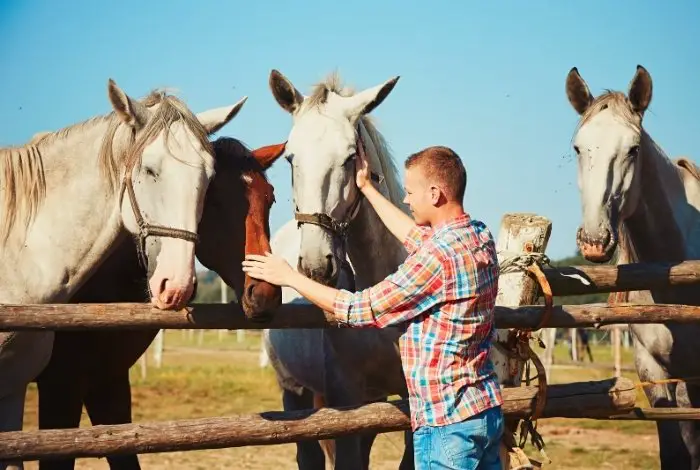
There are more options to own a horse, in this post, we will tell you How To Adopt A Mustang
Conclusion
Buying a horse is a big decision and should not be taken lightly. Take your time and don’t buy a horse for the sake of it, just because you want one now. Don’t be afraid to bring in expert help.
You want to find a compatible partner that you can enjoy for years, not heartache. Here are a few more good questions to ask when buying a horse.
- How tall is the horse?
- Is the horse a good traveler?
- Can you clip the horse without sedation?
- Does the horse have any allergies?
- Has the horse ever been lame?
- Does the horse have any special dietary needs?
- Why is the horse for sale?
- Is the horse ok in a paddock with another horse?
If you have any questions, comment below.
Should you vet check a horse before buying?
Yes, a pre-purchase exam (or vet check) is very important and highly recommended. You may want to do a pre-purchase exam because your horse has a history of injury or illness, or because you want to be sure your horse is healthy before you buy him. For instance, a pre-purchase exam can rule out certain diseases that might otherwise be discovered only later, when the horse is too sick to completely recover.
Veterinarians use a number of tests to check the health of your horse, and the results of the exam will tell you how well your horse is faring. The vet will examine your horse’s eyes, teeth, skin, hooves, legs, ears, mouth and nose. The vet will also test your horse’s muscles and reflexes.
Is buying a horse a good investment?
In general, buying a horse is not a very profitable investment. In most cases you own a horse for the love of it, not to make a profit. A horse is a huge responsibility. It requires an investment of time, money, and emotional commitment. The horse is a living creature, and when you buy it, you have to consider its needs and requirements. A horse needs to be fed, taken care of, and exercised regularly. It requires shelter, and a stable environment is preferable. You must make sure the horse is not subject to dangerous diseases. You must take care of the horse, and you must also be ready to spend money on it rather than make money.
If you can’t afford to buy a horse, you can always rent one for a while. It will give you an opportunity to become acquainted with the horse before you buy him or her.
What is the best age of a horse to buy?
Horses can be purchased from the age of three years, but the horse should have a sound, well-rounded conformation. It is important to have a proper idea of the conformation of the horse before buying it. It is also important to know the horse’s temperament. Older horses are often more difficult to train but normally easier to handle. 10 to 20 years old horses might be the best choice for first-time horse buyers as they are usually well-mannered, easy to ride and don’t cost as much.
What are 5 things to consider when buying a horse?
Horses are animals that require a lot of time, attention and money to keep happy and healthy. A well-cared-for horse can make a great companion and friend. They can also be used for many different activities. For example, they can be ridden, driven, or used for trail riding, barrel racing, dressage, eventing, and dressage. Horses are a great investment and can be a fun way to spend time. But you need to know for sure you can maintain your horse. Therefore you should consider how much the feed, shelter, insurance, veterinary care and shoeing will cost you to start with. Keep in mind that these are basic requirements for owning a horse and that costs can quickly add up.
Michael Dehaan is a passionate horse owner, horse rider, and lover of all things equine. He has been around horses since he was a child, and has grown to become an expert in the field. He has owned and ridden a variety of horses of different breeds, and has trained many to compete in shows and competitions. He is an experienced horseman, having worked with and competed many horses, including his own. He is an active member of the equestrian community, participating in events and teaching riding lessons.
